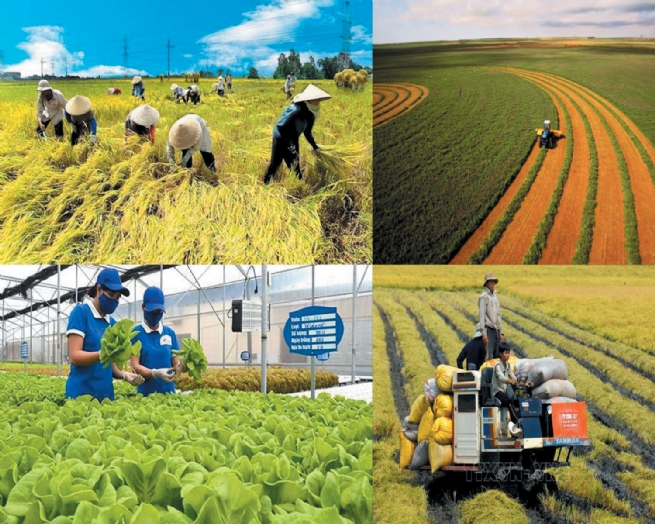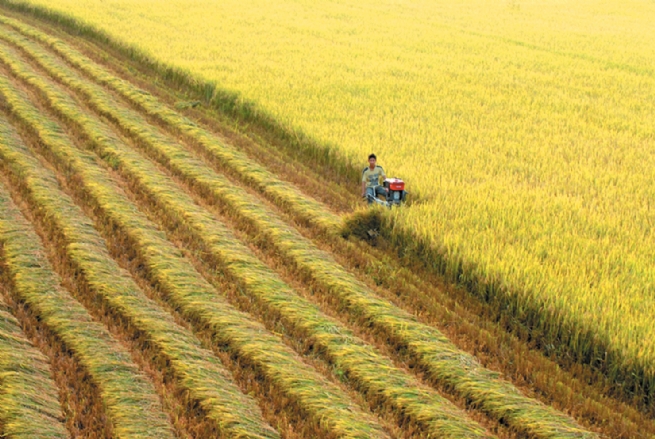10:14:19 AM | 10/11/2024
Vietnam has effectively leveraged its agricultural advantages to sustain growth momentum, transitioning to large-scale commercial production characterized by enhanced productivity and quality. In recent years, agri-exports have consistently increased, solidifying its status as a global agricultural powerhouse. To learn more about sustainable agriculture, our reporter conducted an interview with Mr. Tran Thanh Nam, Deputy Minister of Agriculture and Rural Development (MARD).
 |
The concept of “sustainable agriculture” was formalized in Prime Minister’s Decision 150/QD-TTg dated January 28, 2022, ratifying the Sustainable Agricultural and Rural Development Strategy for 2021-2030, with a vision for 2050. How do you view the efforts of farmers, businesses and the agricultural sector in promoting sustainable development?
Despite facing many challenges, particularly in global markets, the Vietnamese agricultural sector has achieved remarkable export results. The agricultural GDP is estimated to have grown by 3.83%, the highest rate in several years, with export values exceeding US$53 billion. This performance reaffirms agriculture's status as an economic pillar, effectively ensuring food security, maintaining major economic balances and supporting overall macroeconomic stability.
These results show that Vietnam's agricultural sector has adapted rapidly, with both companies and farmers effectively responding to fluctuations in domestic and international markets. While difficulties remain in areas such as aquaculture, forestry, and livestock at certain times, the proactive support from the Party and government including flexible market-opening policies, ongoing promotional efforts, and online conferences with major markets has enhanced our capabilities. Support from Vietnamese diplomatic agencies abroad has also played an important role in this development.

Branding agricultural products is important for enhancing value, improving quality, boosting competitiveness, and elevating the cultural significance of Vietnamese products in the global market
In addition, Vietnam's agriculture has activated the rice-only mindset. Agriculture is not just about growing food crops and raising livestock, but integrating multiple values and creating connections to promote higher values. OCOP products and certifications embody a fusion of multiple values, transforming how agricultural goods are marketed. Rather than being sold raw, these products leverage local resources to develop innovative product lines. By shifting our mindset and production methods, we can create products that cater to diverse market segments. That presents Vietnam with an opportunity to advance toward strong, ecological and organic agriculture, fostering a circular agricultural ecosystem that promotes sustainability and resilience.
The Sustainable Agricultural and Rural Development Strategy for 2021-2030, with a vision for 2050, outlines a three-level branding approach: national brands for key products, provincial brands, and OCOP brands for small-scale products. What are the Ministry of Agriculture and Rural Development's plans in this regard?
Branding agricultural products plays a very important role in increasing value while improving product quality, enhancing competitiveness in the market, preserving and increasing the cultural values of traditional and indigenous products, and raising the position and value of Vietnamese agricultural products in the world market.
Despite achieving impressive export figures, Vietnam is exporting many agricultural products, largely in raw form, and processed foods. Over 90% of products entering the world market still must go through foreign-branded intermediaries. Many Vietnamese agricultural products rank among the world's top exports in their categories; however, they remain largely unknown to global consumers. Approximately 80% of these exported products lack branding, specific labeling, or logos. As a result, they are not fully integrated into global value chains. Many Vietnamese products are exported and sold in international markets under brands that do not belong to Vietnamese companies.
Efforts to brand agricultural products and register certified protection trademarks for many key agricultural products face legal and financial difficulties. To date, only two out of 13 national key agricultural products have been registered for protection in Vietnam, including: Vietnam Rubber (owned by the Vietnam Rubber Association) and Vietnam Rice (owned by the Ministry of Agriculture and Rural Development). Other products such as coffee, shrimp and pangasius are underway for certification.
Regarding regional and local branding, 130 geographical indications are currently protected in Vietnam. 626 agricultural products were protected by local certification marks and nearly 1,900 agricultural products were protected by collective marks as of mid-2023.
The Ministry of Agriculture and Rural Development plans to conduct research and propose the Government to issue a decree on building Vietnamese agricultural product brands. The ministry is also building brands for mango and durian because these two agricultural products currently account for a large share of exports to China.

Industrializing and modernizing agriculture and rural areas is a top priority in the country's development process
Vietnam is emerging as a “green address,” attracting international projects to enhance sustainable agriculture. What are your expectations for the future of agri-entrepreneurs, farmers and cooperatives?
Vietnam clearly expressed its views on developing ecological agriculture, modern rural areas and civilized farmers. These orientations resonate strongly with the international community, inspiring collaboration and support. This approach has not only mobilized resources but has also positioned Vietnam as a friendly and responsible partner in addressing global challenges, enhancing its image on the world stage.
Through the long process of international economic integration, Vietnamese agricultural entrepreneurs, farmers and cooperatives have accumulated many valuable lessons, thus becoming more confident in the international market. Previously, we mainly focused on near markets and easy-going markets, but Vietnamese agricultural products have now reached more demanding markets. Most major markets set strict standards, but Vietnamese businesses and farmers are increasingly active in meeting those requirements.
The Ministry of Agriculture and Rural Development has implemented rapid information mechanisms to effectively communicate foreign regulations and requirements to localities, businesses, and associations through various media channels, forums and seminars. This proactive approach enables stakeholders to swiftly understand and comply with international market demands.
In particular, when confronted with unfavorable market developments, such as the introduction of new standards or trade sanctions, we collaborate closely with the Ministry of Foreign Affairs, relevant agencies and industry associations to address these challenges effectively. This cooperation aims to ensure that competent authorities can effectively resolve bottlenecks and protect national interests.
In the long term, Vietnam needs to ensure compliance with import market standards, develop stable planning and monitor appropriate supply for markets. It is necessary to balance production capacity and consumption demand, and avoid short-term shocks that lead to unsustainable development, such as the “harvest - plant - harvest” situation that is a challenge for many industries today.
Thank you very much!
By Minh Ngoc, Vietnam Business Forum